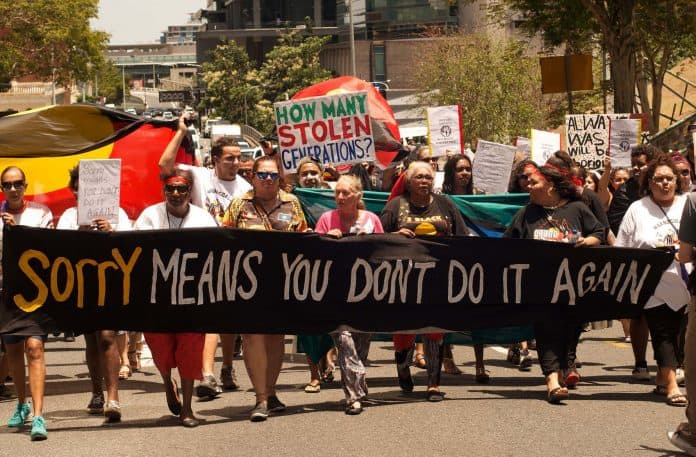Ten years ago, then Prime Minister Kevin Rudd issued an apology to the Stolen Generations, Aboriginal people affected by policies from the early 1900s to the 1970s that systematically removed children from their families in order to force assimilation.
For many Aboriginal people, the Apology was an important acknowledgement of the immense pain they suffered being removed from their country, their culture and their language. But the last ten years has proven how tokenistic this apology was.
In the decade since the Apology, the number of Indigenous children in out of home care has doubled from 9054 in 2007 to 17,664 in 2017. This is a far greater number of children than were removed at any other time in Australian history and the rate of removal is soon set to equal the 20th century Stolen Generations. The money spent removing Aboriginal children and keeping them in “care” is more than $1.5 billion a year.
Larissa Behrendt’s film, After the Apology, explores the consequences of intergenerational trauma caused by forced removal and the fightback from Grandmothers Against Removals (GMAR)—women campaigning to get their kids back from the child protection system.
Through their personal stories we learn of the brutality of contemporary removals. Suellyn Tighe explains how Family and Community Services (FACS) show up unannounced on her doorstep with police at 3am to abduct her grandchildren.
An animation of the story of a mother, Kerry, explains that fabricated evidence was used to justify stealing her 18-month-old daughter Stella. FACS alleged that Stella was playing in the kitchen with dog faeces, but Kerry didn’t even own a dog.
In another animation we hear from Donna, a mother stripped of her toddler because the child was underweight and therefore deemed “neglected”, even though doctors had confirmed this was genetic.
In footage from a fiery protest meeting of affected black families confronting FACS, we learn that a grandmother was denied the role of carer because she suffered post-natal depression 20 years ago. Hazel Collins worked as a nurse for 30 years, but was still denied the care of three of her grandchildren.
Indigenous children are ten times more likely to be in out of home care than non-Indigenous children.
Racism
This is a racist system, underpinned by a Eurocentric view that demonises parenting practices outside the mould of the nuclear family.
Jenny Swan explains in the film that “our culture is matriarchal”, with grandmothers playing a huge role in the grandchildren’s lives. In many Aboriginal communities, the whole extended family is responsible for raising kids and this is a source of strength.
But FACS use children moving between nights with their grandparents, aunties and uncles as evidence of chaos and neglect.
Despite an “Aboriginal Child Placement Principle” written into child protection laws, in 2016 69.8 per cent of Aboriginal children in out of home care were placed away from their Aboriginal families, cutting off connections to culture and community entirely.
This has devastating consequences. The Royal Commission into Aboriginal Deaths in Custody found that two-thirds of the 99 deaths investigated were people who had been removed from their families as children.
The film explores the way that extreme poverty and racism, the direct result of oppression and ongoing colonisation, create the conditions for many child removals.
High rates of family violence, alcohol and substance addiction and homelessness—all triggers for removal—are being made worse by consistent attacks on Aboriginal communities. Rather than supporting struggling families, both state and federal governments are defunding communities and Aboriginal-controlled support services across the country.
After the Apology does not just explain what’s wrong with the system—it is a powerful call to action.
We see the way that Grandmothers and other family members are fighting hard on the ground for change. Protests at parliament house, rallies and sit-ins at FACS offices and public meetings to build support are all strategies being used to force FACS to consult with families and return children.
Recent policy developments have demonstrated the urgency of stepping up this fight. Governments across the country are moving to get court orders placing Aboriginal children, even newborn babies, in out of home care until they are 18 years old, almost immediately after they are removed.
In NSW, Minister Pru Goward is loosening restrictions on adoption and has recently granted a massive injection of funding into adoption services.
All this makes the possibilities of restoration to family far harder. And despite a damning Royal Commission into the horrors children suffer in the NT juvenile detention and foster care systems, NT Minister Dale Wakefield recently announced the government was committed to removing even greater numbers of children from their families.
By Ruby Wawn
After the Apology
Directed by Larissa Behrendt
Screening in cinemas via Demand.Film






